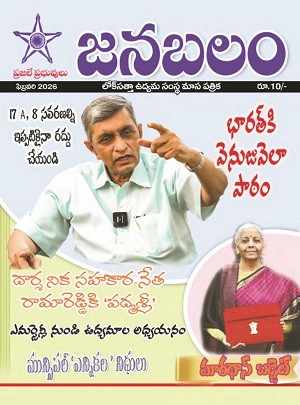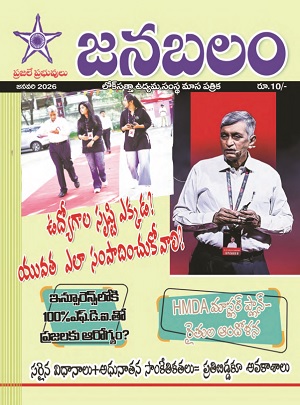Terming the Supreme Court verdict striking down the National Judicial Appointments Commission (NJAC) Act as hasty and patently unconstitutional, Loksatta founder Dr. Jayaprakash Narayan today demanded that an emergency session of Parliament be convened immediately so that it can assert its supremacy in determining the procedure for judicial appointments.
Addressing a media conference, Dr. JP recalled that Parliament had enacted the Constitution 99th Amendment providing for the NJAC to recommend appointments and transfers in higher judiciary as the Supreme Court by judicial pronouncements had usurped the power to recommend appointments through a collegium of judges.
The Foundation for Democratic Reforms (FDR) and Lok Satta have for long argued that appointment of judges by collegiums of judges is antithetical to democracy and accountability. At the instance of the FDR/Lok Satta, three eminent jurists of unimpeachable integrity (Justice MN Venkatachaliah and (late) Justice JS Verma, both former Chief Justices of India, and (late) Justice VR Krishna Iyer, former Judge of Supreme Court) had studied the system and recommended constitution of a National Judicial Commission (NJC) for recommending judicial appointments. The NJAC proposed by the Government is on the lines of the NJC recommended by the three jurists.
Fearing the repercussions of quashing the 99th Amendment, Dr. JP in a September 15 letter to the Prime Minister, the Leader of the Opposition and all MPs had said that if the 99th amendment is quashed by the court, it will be a fit case for Parliament to stand its ground and assert its supremacy in determining the procedure for judicial appointments.
Dr. JP said there are three compelling reasons why judicial appointments cannot be the sole preserve of the judiciary.
First, no organ can appoint itself in a democracy. The SC cannot be a self-appointed permanent priesthood. "Independence of judiciary does not mean judges are independent of the Constitution. By SC's logic, Election Commission, Comptroller and Auditor General, Union Public Service Commission, Central Vigilance Commission, Lokpal, - all must appoint their own successors to preserve their independence." Every state functionary must derive legitimacy from people directly or indirectly. Second, in all democracies judges are appointed by government and legislature with participation of lay citizens. In the US, the UK, Canada, Germany, France and other democracies where government is the biggest litigant, judges are not appointed by judges. "It is universally accepted that democracy and justice are too important to be left to judges alone."
Third, it is important to protect the credibility of the higher judiciary. If the Court’s credibility is eroded because of usurpation of powers not granted under the Constitution, it will hurt the court, the Constitution and democracy. Only a credible and respected Supreme Court can safeguard the Constitution and the nation in a highly polarized society with a propensity to visceral reactions based on primordial loyalties of caste, religion, region and language. The frequent agitations for and against reservations in education and public employment, highly emotive issues like the Babri Masjid-Ram Janmabhoomi dispute, river water sharing, and other highly contentious disputes in a complex and diverse society need to be resolved away from partisan politics, and in the cold light of logic, Constitution and the law.
Dr JP urged that the Parliament should meet in an emergency session and debate threadbare the mechanism for judicial appointments. The issue must be beyond parties and petty politics. Mrs Sonia Gandhi already wrote to FDR on Sept 23 pledging continued support of Congress party to NJAC. The media, civil society leaders and eminent citizens must come together to resolve the issue peacefully in keeping with democratic norms, judicial independence, constitutionalism and political consensus.
Dr. JP said the Supreme Court verdict also underlined the need to cleanse politics and not to revile and reject it. "We all love to hate politicians. But the answer to dirty politics is not divine institutions; it lies in political reform. Political parties abusing and opposing each other recklessly has led to a culture of revulsion of politics. This climate has led to today’s SC verdict."
Friday, October 16, 2015
Subscribe to:
Post Comments (Atom)





This is ridiculous, please stop denigrating the judiciary for your narrow selfish motives.
ReplyDelete